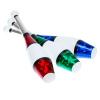I've been working as a screenwriter in independent film for a few years. I want to write for games... eventually. For now, I just want to start by understanding how games work on the technical side (sprites, objects, how/why things move or don't and are solid or not, processes or methods of implementation, etc.). I will choose a language to focus on soon (leaning towards Python), but I must walk before I can run... and I don't even know where my legs are yet.
My goal is to get a foundation with 2-D games, move to 3-D and create a few solid games to use as a calling card to get a job at a company and work with a team on 3-D games (ideally). I know you can write for games without necessarily coding them yourself, but I want the experience and understanding that comes from doing so, even if I never get really good at it. In film I've done just about every job there is and, no matter how seemingly unimportant or unrelated to screenwriting, I know it has all helped with my work as a writer on productions with a large team.
Most of the things I've found in my research on games are supposedly aimed at beginners, but already contain a lot of terms and concepts that aren't explained very well for total newcomers. Either that, or I am just dense --which is entirely possible. I am a writer. ;)
I'd like some recommendations on reading/viewing materials or even languages/engines for someone coming form a different field with only minor experience in the technical world. I'm not looking for info on how to make GDD's or the "developing your idea" side of games (sloperama has a wealth of good stuff on that) but I want to understand how games are made from the coding side and begin making some myself. I'm just having trouble finding something that explains things in terms I understand. Thanks for your time.
- My non-writing skills:
Ancient HTML (my last web dev job was 2001. It's something though, right? I did a lot of problem-solving and... Wait, why are you laughing? Okay, yeah, it's very old experience).
Photoshop.
Various Film editing programs.
Various Audio editing programs.
A 2-D Animation program.
I am learning Blender. Time will tell if I get any better at it.
I am experimenting with Game Maker but I don't feel it's giving me an understanding of what I am really doing. I can make things happen but I don't know why they happen or don't. If I could see code created that corresponds to the drag/drop, then I could see why something works and what it does. I like to deconstruct. Is there such a way to view things in GM that I haven't found yet?
Simple tech tutorials, books on game programming for total newbie from another field?
I don't have a complete answer you are looking for but what I can tell you from my experience it really helped to start with the easy games such as pong and poker (text based). If you run into syntax you are unfamiliar with then google is your goto man. This will help you learn concepts and key words as you go along but it will take a bit more effort. You'll find as you program not a lot is just given to you, you have to go out and search and sometimes all you come back with is half of what you wanted.
I think its best to start with a little at a time. If you start with pong and build up you'll start to learn the process and whan needs to be done as things get bigger. You can watch youtube videos to get a bigger idea of what the proccess is but the best way (I think) is to start small so you understand the little things then move on.
I think its best to start with a little at a time. If you start with pong and build up you'll start to learn the process and whan needs to be done as things get bigger. You can watch youtube videos to get a bigger idea of what the proccess is but the best way (I think) is to start small so you understand the little things then move on.
Thanks for the reply.
Yes, I intend to start with small and simple games like pong, just to get the basics down, then move to slightly more complex games. I have tried to follow some beginner tutorials, but they often just tell you "Do this... Now do this and this... Congratulations! You made a game." --I still won't know what I just did or how it works, because it's never explained. Heck, the most I've learned so far is just by trying to break what I'm told to do. I want to understand what I'm doing and how it works so I know why I'm doing it.
Yes, I intend to start with small and simple games like pong, just to get the basics down, then move to slightly more complex games. I have tried to follow some beginner tutorials, but they often just tell you "Do this... Now do this and this... Congratulations! You made a game." --I still won't know what I just did or how it works, because it's never explained. Heck, the most I've learned so far is just by trying to break what I'm told to do. I want to understand what I'm doing and how it works so I know why I'm doing it.
from reading your posts, you should be up and going in no time
starting out with python may be a wise choice, since it's user-friendly (just like programming should be!)
there are probably sites out there that describe the fundamentals of programming and programs, which is probably where your first stop should be
http://www.careercampus.net/resources/programming_fundas.htm
the link above seemed like a good fundamental description.. =) hope it helps
starting out with python may be a wise choice, since it's user-friendly (just like programming should be!)
there are probably sites out there that describe the fundamentals of programming and programs, which is probably where your first stop should be
http://www.careercampus.net/resources/programming_fundas.htm
the link above seemed like a good fundamental description.. =) hope it helps
As far as programming is concerned, I would suggest the Python language for a beginner. If you decide to go this route, then you should get Python Programming for the Absolute Beginner by Michael Dawson. It's a wonderful book that will actually explain why the ball moved across the screen And if the book does not seem to help you out then you can either: join the Python tutor mailing list (the book tells you how to get to it), http://wiki.python.org/moin/BeginnersGuide , or google like bakshadow said above.
And if the book does not seem to help you out then you can either: join the Python tutor mailing list (the book tells you how to get to it), http://wiki.python.org/moin/BeginnersGuide , or google like bakshadow said above.
Also as far as learning all of the ins and outs about the gaming industry, THIS is very helpful.
And don't feel alone, I made a website on the ancient html and it does count for something
Also as far as learning all of the ins and outs about the gaming industry, THIS is very helpful.
And don't feel alone, I made a website on the ancient html and it does count for something
Thanks for the replies and links, guys! I look forward to doing a lot of reading this weekend. 
I'd like some recommendations on reading/viewing materials or even languages/engines for someone coming form a different field with only minor experience in the technical world. I'm not looking for info on how to make GDD's or the "developing your idea" side of games (sloperama has a wealth of good stuff on that) but I want to understand how games are made from the coding side and begin making some myself. I'm just having trouble finding something that explains things in terms I understand. Thanks for your time.
I think this post is pretty much exactly what you are looking for. It's a guide for new developers looking to get started game programming, covering the merits for each language, then giving library recommendations, tool and reading suggestions for each. From an art perspective these are pretty much all of the traditionally used 3D applications, while these are the most commonly used engines.
Basically if you read through all of that, you will more or less have all the foundations you need to make the next step. Of course, it only scratches the surface of a very large iceburg... there are literally thousands of language and library combinations, but this captures the most common choices.
After that, it's all about experience. Dont spend too much time figuring out *HOW* you are going to do something, until you've done it, you wont really be qualified for figuring it out in the first place! ( Yes, its a catch-22 ). Just pick something from that first link and run with it, you cant really make a mistake at this point. Then start small and build off your successes. What inititally seems like a miles high mountain can be scaled pretty quickly if you put your head down and jump in.
This topic is closed to new replies.
Advertisement
Popular Topics
Advertisement







